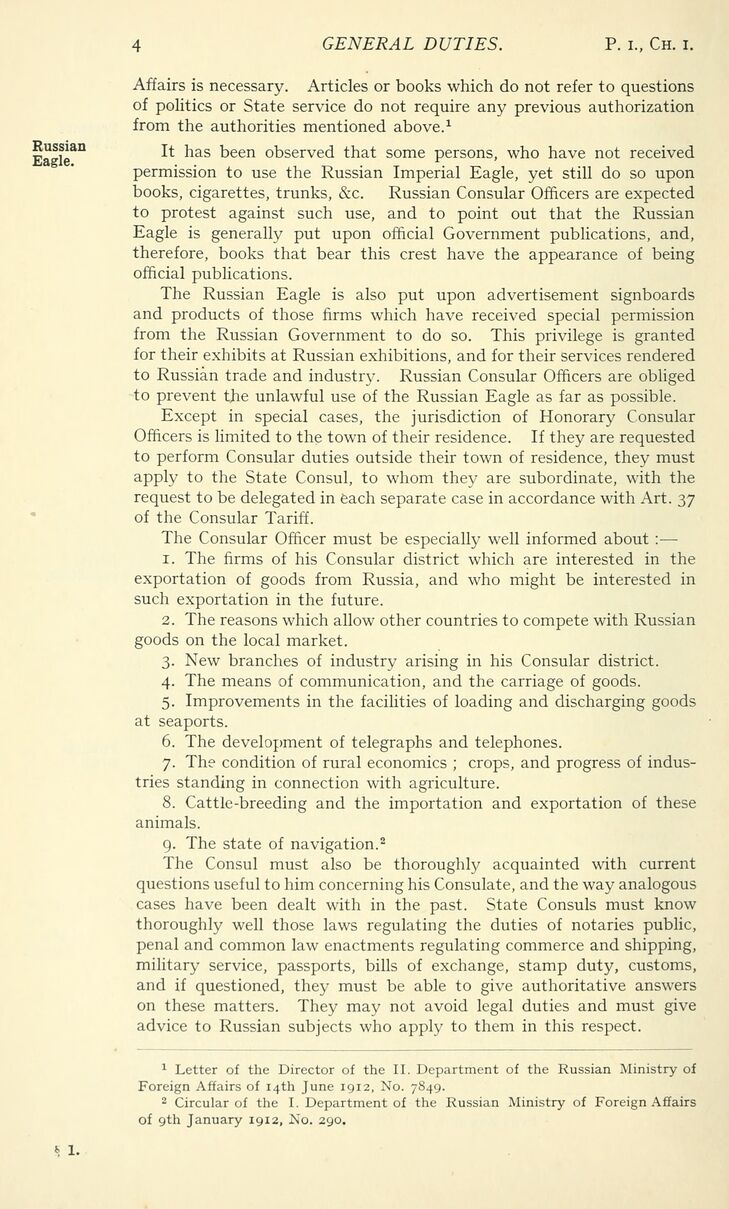
Full resolution (JPEG) - On this page / på denna sida - Chapter I. — General Duties

<< prev. page << föreg. sida << >> nästa sida >> next page >>
Below is the raw OCR text
from the above scanned image.
Do you see an error? Proofread the page now!
Här nedan syns maskintolkade texten från faksimilbilden ovan.
Ser du något fel? Korrekturläs sidan nu!
This page has never been proofread. / Denna sida har aldrig korrekturlästs.
4
GENERAL DUTIES.
P. i., Сн. i.
Affairs is necessary. Articles or books which do not refer to questions
of politics or State service do not require any previous authorization
from the authorities mentioned above.1
It has been observed that some persons, who have not received
permission to use the Russian Imperial Eagle, yet still do so upon
books, cigarettes, trunks, &c. Russian Consular Officers are expected
to protest against such use, and to point out that the Russian
Eagle is generally put upon official Government publications, and,
therefore, books that bear this crest have the appearance of being
official publications.
The Russian Eagle is also put upon advertisement signboards
and products of those firms which have received special permission
from the Russian Government to do so. This privilege is granted
for their exhibits at Russian exhibitions, and for their services rendered
to Russian trade and industry. Russian Consular Officers are obliged
to prevent the unlawful use of the Russian Eagle as far as possible.
Except in special cases, the jurisdiction of Honorary Consular
Officers is limited to the town of their residence. If they are requested
to perform Consular duties outside their town of residence, they must
apply to the State Consul, to whom they are subordinate, with the
request to be delegated in each separate case in accordance with Art. 37
of the Consular Tariff.
The Consular Officer must be especially well informed about :—
1. The firms of his Consular district which are interested in the
exportation of goods from Russia, and who might be interested in
such exportation in the future.
2. The reasons which allow other countries to compete with Russian
goods on the local market.
3. New branches of industry arising in his Consular district.
4. The means of communication, and the carriage of goods.
5. Improvements in the facilities of loading and discharging goods
at seaports.
6. The development of telegraphs and telephones.
7. The condition of rural economics ; crops, and progress of
industries standing in connection with agriculture.
8. Cattle-breeding and the importation and exportation of these
animals.
9. The state of navigation.2
The Consul must also be thoroughly acquainted with current
questions useful to him concerning his Consulate, and the way analogous
cases have been dealt with in the past. State Consuls must know
thoroughly well those laws regulating the duties of notaries public,
penal and common law enactments regulating commerce and shipping,
military service, passports, bills of exchange, stamp duty, customs,
and if questioned, they must be able to give authoritative answers
on these matters. They may not avoid legal duties and must give
advice to Russian subjects who apply to them in this respect.
1 Letter of the Director of the II. Department of the Russian Ministry of
Foreign Affairs of 14th June 1912, No. 7849.
2 Circular of the I. Department of the Russian Ministry of Foreign Affairs
of 9th January 1912, No. 290.
Russian
Eagle.
<< prev. page << föreg. sida << >> nästa sida >> next page >>